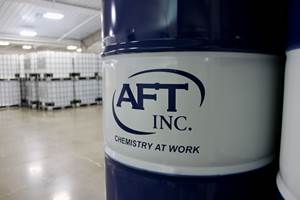Eliminating Contaminants In Coolant Management System
Just over 2 years ago the owners of Wanner Engineering made the investment decision to purchase highly automated machining systems with special cooling systems.
Share


.png;maxWidth=45)
DMG MORI - Cincinnati
Featured Content
View More
ECi Software Solutions, Inc.
Featured Content
View More

Autodesk, Inc.
Featured Content
View More
Takumi USA
Featured Content
View More

Hwacheon Machinery America, Inc.
Featured Content
View MoreJust over 2 years ago, Bill Wanner and Payton Hage, owners of Wanner Engineering (Minneapolis, Minnesota), made the investment decision to purchase highly automated machining systems. The 25-year-old company needed the flexibility and productivity provided by such a system to outpace its competition and remain responsive to customers' delivery requirements. According to Mr. Hage, flexibility was a critical factor.
"Wanner Engineering designs and manufactures pumps for a variety of industries, used in all types of environments," Mr. Hage explains. "Our pumps are used in such applications as carwashes, trucks for lawn care and steam carpet cleaning, cogeneration power plants for lime slurry and submarines producing nuclear grade water by reverse osmosis. The pumps are also used in machine tools for both low and high pressure applications, with diaphragm-style pumps that handle coolants with particles up to 500 microns in size. They're used for pumping all types of fluids—hot, cold, acids and corrosives, and thick suspensions.
"We wanted the agility to be able to fill a customer's order for a single pump, when necessary, by machining all the needed components on a just-in-time basis. This could mean running an aluminum housing, followed by a stainless steel manifold, plus steel cylinders, cast iron cylinder housing and valve plate, and numerous other parts from any of the materials—one right after the other."
The machining system Wanner and Hage chose consisted of two horizontal machining centers and a 15-pallet part pre-staging, machine loading/unloading and transfer unit. They also specified that each machine be equipped with Mayfran International's (Cleveland, Ohio) ConSep 2000 chip handling conveyor/coolant cleaning systems.
"We've worked with Mayfran in the past, providing pumps for many of its systems, so we were familiar with the operation of the ConSep," says Mr. Hage. "It's ability to handle a wide variety of chip shapes and volumes produced from different materials seemed the ideal option for our particular application. And, because the machining system operates with high pressure coolant flow, we also added bag filter units to clean the coolant."
And, for the most part, reports Mr. Hage, the machining system and the ConSeps have lived up to their expectations. Except, that is, for one small detail: Although a variety of materials are used, the predominance of cast iron machining meant a large amount of small fines and super fines (below 50 microns) were accumulating as sludge and clogging up the bag filters, restricting coolant flow and requiring frequent maintenance for cleaning.
"It was somewhat ironic and very irritating that the coolant system—in particular the bag filters—would disrupt our productivity," Mr. Hage remarks. "Our machine operators reported that the filters, when processing cast iron parts, would slime up in a matter of minutes. This may be slightly exaggerated, since they were responsible for maintaining the machines and replacing the filters, but not far from missing the mark . . . the productivity and flexibility we sought were lost to a large extent because of this sludge removal downtime."
Consider, for example, the blockage of coolant distribution channels that will restrict and reduce flow to tools and parts. This can result in chips not being properly flushed from parts and workholding devices, premature tool wear, inaccurate tool compensations and higher temperatures that can work harden areas of the part. Eventually, the entire coolant management system will not function properly. Also, when chips, fines and super fines accumulate in the reservoir to the point where their volume displaces too much of the fluid, pumps cavitate and the coolant temperature elevates, resulting in evaporation and possible issues detrimental to part quality.
Fortunately, this condition did not exist long, as Mayfran shortly thereafter introduced the AT-Coolant Cleaner, an independent, maintenance-free, media-free coolant filter unit that easily integrates with the ConSep system. The new filters provide 10-15 micron coolant cleaning, in addition to the ConSep 2000's preliminary 50-micron separation, through a mechanical process. Particles and sludge, separated from the coolant, are carried away by conveyor to a scrap hopper.
Once installed, the CS-2000 and AT-Coolant Cleaner combination has virtually eliminated migration of process-harmful contaminates to the "clean side" of the process, a critical element in today's high pressure operations.
For Wanner Engineering, this means unrestricted flow rates running at variable rates of up to 15 gpm and in pressures from 800 to 1,000 psi, plus less wear on machine tool components, workholding devices and tools, and longer coolant life. In addition, the company's waste stream liability has been lowered, and the potential for spills and overflows has been greatly reduced.
"We've been operating the machining cell for about 18 months now, with the AT-Coolant Cleaners on the job," notes Mr. Hage. "In that time the system has not had to be shut down once for cleaning of chips or sludge. This performance has exceeded our expectations."
Related Content
LNS Chipblaster Provides High-Pressure Coolant Using CNC Interface
The Chipblaster S Series is designed to precisely apply high-pressure coolant where and when required.
Read MoreAFT's Semi-Synthetic Coolant Extends Sump Life
Advanced Cool 2200 provides high visibility while machining, keeping the machine and parts clean with no odor issues.
Read MoreHenkel Redefines Industrial Machining and Grinding with Sustainable Metalworking Innovation
With innovative formulation and bio-resistant properties, Henkel’s new semi-synthetic lubricant emerges as a pioneering solution in the machining industry.
Read MoreSustainability Project Cuts Costs for Growing Manufacturer
A custom coolant and chip management system has helped Youngers and Sons lower its supply costs, improve its recycling margins and maintain a clean shop floor.
Read MoreRead Next
Registration Now Open for the Precision Machining Technology Show (PMTS) 2025
The precision machining industry’s premier event returns to Cleveland, OH, April 1-3.
Read More5 Rules of Thumb for Buying CNC Machine Tools
Use these tips to carefully plan your machine tool purchases and to avoid regretting your decision later.
Read MoreBuilding Out a Foundation for Student Machinists
Autodesk and Haas have teamed up to produce an introductory course for students that covers the basics of CAD, CAM and CNC while providing them with a portfolio part.
Read More















































